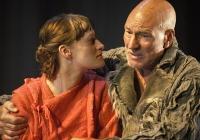The Tempest Review RSC 2007
The last of Shakespeares plays, 'The Tempest' is not only more accessible for most people - the language and the plot are easier to follow than in many of The Bard's other plays - but it's also the work of a master craftsman who wove a truly enthralling and captivating spell, in a final display of his vast literary talents.
This is the story of the Duke of Milan, Prospero, and his daughter, Miranda. While Miranda was still an infant, Prospero had his head buried in books about magic and the black arts, leaving his brother to look after affairs of state. As one might expect in such a situation, his brother saw the chance to get rid of Prospero and grab the Dukedom for himself. So, Miranda and Prospero were duly bundled off in a leaking boat, but fortunately fetched up on a remote island. And there they've lived out 12 years in the company of a creature called Caliban, and a number of spirits that Prospero conjured up to do his bidding - well, even an impoverished Duke needs servants!
The play starts with a shipwreck during a violent storm just off the island where Prospero and Miranda live. The occupants of the vessel are Prospero's brother, the King of Naples and his son, and various courtiers. At first, it seems that all on board have perished, until we realise that it's Prospero who's controlling the tempest. And in fact, from there on in, Prospero controls all the events, just like a playwright controlling the plot.
Most scholars claim that this is a story about revenge, but I'm afraid I disagree. If revenge was ever on Prospero's mind, it's now dissipated if only because he has to think about his daughter's future. So, when Miranda asks him if he's stirred-up the tempest, he says: "I have done nothing but in care of thee". So, what Prospero is up to is to secure a husband for his daughter and to get her back to civilisation. It's true that he toys along the way with those who usurped him, but it's more to do with keeping them out of the way while he arranges for Miranda to get to know Ferdinand, the King of Naple's son. And, sure enough, they fall in love and are betrothed.
Mariah Gale's Miranda is a peculiar girl who has rather odd, doll-like gestures, and is dressed in androgynous clothes. But at the start of the play, she shows that she also has a mind of her own and a wilful personality when she regales Prospero for setting the storm and making the occupants of the ship suffer. A strong start petered out into odd mannerisms which seemed intended only for laughs.
Patrick Stewart brings all his immense acting talents into gear to reward us with a very fine, if fairly traditional performance. Stewart's Prospero is a man in total control, but as bitter as his surroundings, and has a pretty violent streak, particularly when dealing with Caliban. But one can't help wondering if Stewart's Prospero would ever have allowed his brother the opportunity to usurp him in the first place!
Julian Bleach's Ariel has more in keeping with Dracula horror movies than the 'fairy' variety of spirit. This is no feminine Ariel - it's a deliberate and very scary being who has immensely frightening powers even if they don't quite match those of Prospero. On the other hand, John Light's Caliban - a creature conceived in a mating between a witch and probably the devil, and described by other characters as looking like a fish - is about as frightening as watching body-builders working out in a gym. Light would have benefited from something from the scary shelf of the wardrobe department to gives us something we could believe to be only vaguely human.
Giles Cadle's design presents us with a bitterly cold and inhospitable island that seems at odds with some of Shakespeare's descriptions of it - in particular those delivered by Caliban. But, since Prospero has power over the elements, there's plenty of room in this play for imaginative design. And Cadle jumps at the chance in the opening sequence where we're treated to a neat view of the chaos on the King's ship during the storm. And there are other magical surprises too, particularly Ariel's appearances from the most unlikely of places.
Rupert Goold's production is both stimulating and fascinating with excellent use of effects, sound and music, though it did seem to drag somewhat in a rather protracted first half. There's certainly enough in the way of creative invention to be novel and sufficient humour to alleviate some of the darker aspects of the piece. It's still, though, a fairly traditional interpretation of Prospero's motives. For me, 'The Tempest' is not about revenge, but a man orchestrating events in one final display of his terrifying powers in order to secure a future for his daughter. At the same time, I think he's enjoying himself enormously in the process as I think Shakespeare was in writing his final piece. Indeed, when Prospero delivers his epilogue at the end of the play, it's actually Shakespeare addressing us, even from the grave.
What the critics had to say.....
NICHOLAS DE JONGH for THE EVENING STANDARD says, "Goold's Tempest makes real theatrical magic." CHARLES SPENCER for THE DAILY TELEGRAPH says, "Goold's RSC staging is so exciting, his vision of the play so powerfully emotional...Patrick Stewart's magnificent Prospero. He plays the role with tremendous power and depth of feeling, and delivers the beautiful verse with superb authority." SAM MARLOWE for THE TIMES says, "The production as a whole is a serious enchantment, as capable of warming the heart and the intellect as of freezing the marrow."
External links to full reviews from popular press
The Times
Daily Telegraph
Production photo by Manuel Harlan
Originally published on
